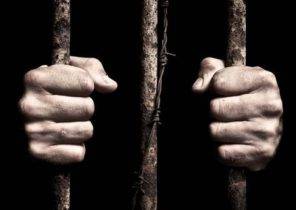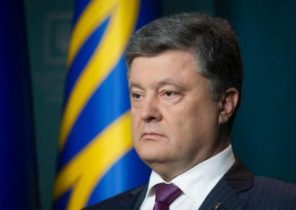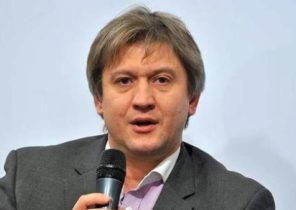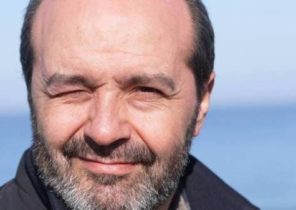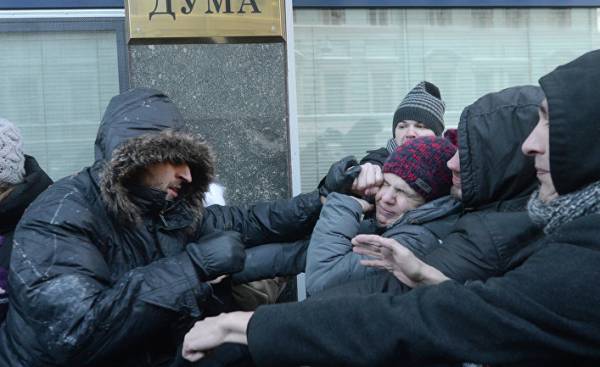
For Maria Eliseeva became too hard to breathe in Russia — her desire to combine work, family life and political activity have become an unsolvable equation. The so-called law on gay propaganda has complicated the lives of many of those who belong to sexual minorities of our country is the neighbor in the East.
It was a hint. And not even very subtle. They stood in the teachers ‘ lounge, they had a problem with two girls at school told me that in love with each other. Other teachers discussed how to handle the situation, because girls need to know that homosexuality is wrong and abnormal. But Mary said that they should not say something like that. Then other teachers began to ask questions. Why not? Why do you say that? Are you like this?
Maria felt that it is best to leave the school. Gradually, she realized that it is better to leave Russia at all.
Later awareness
The first week of April was truly awful. On Monday, a bomb exploded in St. Petersburg, where Maria lived for a long time. The same evening a plane full of deported Afghans who received a negative response to their requests for asylum, went from Helsinki to Afghanistan. To top it all began to fall the flow of information on the torture of homosexuals in Chechnya. Say, many died.
The latter applies especially to Maria Eliseeva, so she was a lesbian and came from Russia. She grew up, went to school and received a teaching degree in a small town in the North Caucasus, in southern Russia near Chechnya — and then in 20 years moved to Saint Petersburg to study child psychology. A few years ago she returned to their places of origin, but it was not a very good solution. Because around the same time she realized their sexual orientation.
“I didn’t realize that homosexual and 29. In this small town not too much information about it and about people unlike others”.
Mary always felt that there’s something wrong. At school the other girls were interested in boys and she doesn’t. She instead heavily studied or played sports, reading and watching movies.
“I understand how things work, much later. Then I had to figure out whether it is possible to live with this openly in our society. I was an English teacher and worked with children for 10 years, it was the career that I wanted.”
A career that had to be postponed indefinitely. As September 2016 Maria arrived in Helsinki and asked for asylum. In January she received a refusal for his application and appealed to the Supreme constitutional court.
“I have no expectations about how it will… the Migration Department says that I can move somewhere in other place within the United Kingdom. But so what, I have the same problems wherever I go.”
“Homosexuals are sick and should be burned”
In 2013 in Russia came into force the so-called law against homosexual propaganda aimed at children. The law was very vague, so it is not always easy to understand what really is considered homosexual propaganda.
“Some politicians say that homosexuality is a disease, that homosexuals must be burned. But most people believe that homosexuals have the right to do what they want until they don’t show it openly, for example, they should not share your photos with social networks. Teachers are judged and sentenced to punishment for these photos on instagram and from work kicked”.
Most of all, Maria is afraid to lose his job. She genuinely wants to work with children.
“When you work with kids, you have to be honest with them. My job is not only to teach them English grammar, I still need to tell them about life, about different people. After all, we want their generation grew up best. But to talk about the fact that homosexuals are normal people, cannot. And you can’t tell kids that they are normal, if they come and say that they are gay”.
Force yourself to be quiet difficult
Nothing special did not happen, that was the last straw Mary and forced her to leave Russia. She just could no longer withstand the pressure to which long time was exposed. Not being able to pick off children that picking on and calling someone a fag. Not being able to tell someone about his love. Be in danger every time there was a danger that something will become known. To sit quietly.
It was awful to sit and listen to people who tell you what to do with homosexuals, says Maria. She had heard that gays have no right to live, that they do not have to be the same rights as all the others. That they should be burned, killed and locked up in a mental hospital. They need to be very careful not to show their relations to others.
“It was awful. To sit and be silent if you agree with all this. Inside me lived a terrible conflict. To make that choice… for me it was too much.”
The choice, which says Mary, for those three areas of life that matter to her most: to work professionally with children to be politically active and to disseminate information about the injustices in society.
“But in Russia I can’t do it all at once. Can’t even two out of three. I either activist, but then don’t work with kids and have families of their own. Or I choose a family, but then I have to minimize contact with the outside world — except that some friends knew about it but me and my children would have to hide all the time and face the hostility. My children would be subjected to persecution both from other children and from adults, and teachers. Parents of other children would protest against the fact that children of lesbian parents studied in the same class as them.”
If Maria chose a career in teaching, then she’d have to abandon the family, and activist activities, she says. None of these alternatives separately would not have made her happy enough to continue to live like this.
Attacked in the subway
Finally, all that crossed the border. Maria had not seen a ray of hope, all actions and events that she made as an activist, banned, whatever, and did it attempt to organize a pride parade or a single protest. The new law on extremism have been implemented in the past year. The bill meant, for example, that someone on the Internet calls for terrorism or Express support for terrorism may be sentenced to 7 years in prison, that is, the same punishment which now may be followed for such appeals in the Russian media.
“I was scared that they began to refer to the paragraph on extremism when dealing with peaceful demonstrators and activists. They can be arrested by applying brute force, then they have to pay a monthly salary to be released. If you’re going to protest in Russia, you know that you 100% get arrested.”
In fact, the people who come to “illegal demonstration”, can be sentenced to a fine, and is approximately equal to the sum of the annual Russian salary.
Mary was also the incident with the police. Her in the underground attacked the woman and broke her finger.
“She heard me talking on the phone with his girlfriend and started yelling at me. The police did not want to deal with this case. They said not too troublesome now to prosecute? I realized that they were not going to help me, and so I didn’t dare to tell them that I’m gay. And they probably would have taken the direction of that woman.”
A great relief it was to find a similar
Maria can cite many examples where friends and acquaintances got into a difficult situation due to their orientation, so she knew what to avoid. It was not fired, but was given to understand that she was not pleased. Gay friends she found through a Coming Out, an organization that works with the rights of the LGTB minorities in Russia.
“I really didn’t have enough meetings with the same, as I to gain understanding and support. Coming Out staged events, for which it was safe to walk. There I had a support group, access to therapy and the opportunity to participate in the organization of events. Queerfest and the like. It was great to feel among the same people, to be able to reveal your whole personality.
Maria constantly teetered between friends who knew about her orientation, and friends from whom she had to hide it. To keep my mouth shut was hard. She was going to a gay event, but had to lie, which goes to a concert. If the friend with whom she said wanted to go too, she had to convince him that there will probably be terribly boring.
Freedom of speech is constantly oppressed
Another aspect that worsens the situation for gay activists and homosexuals in Russia is the Internet censorship and the new law on extremism. For many years the Internet was the only place where there was freedom of speech, and in different parts of the network, blogs and chat rooms gays can find something similar. But the recent censorship of the Internet is really gaining momentum, says Maria Eliseeva.
“Now you can’t write any criticism of the government or the President. If you do repost the images with criticism or statuses in social networks, your home can be searched by the police. Even the cartoons on Putin banned”.
Maria says that Putin is Western leaders Russia as a democratic society. But she believes that in Russia the freedom of speech is valid only as long as you play by the rules of the government.
“It’s very hard. You are not free, can’t breathe. You never know what will be the consequences to you. There is no guarantee that this will not affect you or your friends. You have no right to privacy, no information about you will not remain secret, they’ll find out through the Internet and social networks. If they need some kind of law to get their way, it is his writing, not listening to any criticism and spitting on the fact that this law goes against human rights or the Constitution.
In Finland there was a feeling that there is no need to fight
When Mary came to Finland, it seemed to her that it is so easy to all it is that everything is very passive.
“No need to fight for their rights because you have them all and for all!”
Particularly struck by her story of the Guggenheim Museum in Helsinki. After the city vote in Helsinki, it became clear that the Museum will not.
“People do not like the Guggenheim, and the Guggenheim did not. In Russia, this would never have happened!” — Maria laughs. He knocked me out, then the leaders really listen to people.
During his first demonstration in Finland Maria was worried. Will the police use violence? How to behave safely? But her friends-activists assured her that all will be well. “It’s your human right to Express their opinion!” they said. With the police there will be no problems.
“It’s great when the police is working to ensure the safety of people, not to attack them”.
Now the happiest time in my life
Pending the decision of the Supreme constitutional court, Maria Eliseeva finds something to do. She met with many, and prejudices that in Helsinki and Finland is boring, many times been refuted. Everyone here is so friendly, she says, to begin to participate in some activities, it should be very little. She will soon complete the initial course of the Finnish language, cinema and theater, sometimes involved in the demonstrations.
“I live with people who are sympathetic to those seeking political asylum, they offered me them to come. It’s very cool, otherwise I was sent from Helsinki to anywhere else. I try to learn every day, to seek employment or to further education. I am involved in an artistic project, supported HeSeta (Helsinki Department of SETA, a non — governmental organization for the protection of human rights and sexual minorities in Finland — approx. transl.), to help shape the message about what it means to be gay and refugee status.
A society where only one opinion is correct, where people believe everything they see on TV and in the news, riddled with propaganda, says Maria. Children not in school to ask questions or to think critically, she says.
“The government will tell you it’s time to fight, and all will go to fight. No one will doubt and say, “Hey, maybe there’s another solution?” In Russia, all the people influenced by this. The feeling is that it is useless to try to understand and to explain to them that this truth may not be so… truthful.”
“The Russians, besides, so exhausted are the ones trying to rebuild their lives economically that they have not enough strength for caring for others, about the starving in Africa or the rights of sexual minorities. They think only about how to survive another day. So the activism in such a society are not very good. But in the latest protest against corruption was attended by many young people. This gives me hope: they have the Internet and they can see that in other countries different. They see that their parents are unhappy with their lives, do not see any future for themselves in Russia. They begin to think about what to do differently, then maybe the world will be better. And although now there are more acute problems, such as Syria, this does not mean that other human rights are less.”
Yle: do You now feel more happy, than in Russia, although do not expect a positive decision?
Maria Eliseeva: This is the happiest time in my life. I’m happy every day, whatever happens. Sometimes I laugh out loud when talking about some of their problems, like when I missed the bus, which left a minute before. Is that my worst problem right now?! In comparison with my previous problems, this kind of nonsense. It makes me happy.

